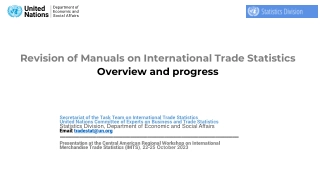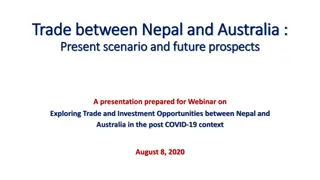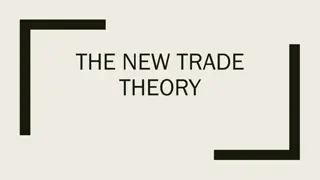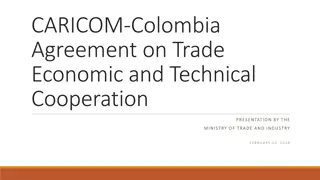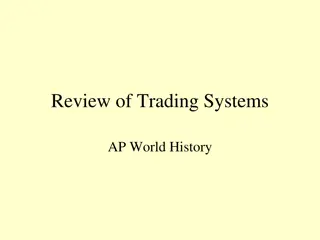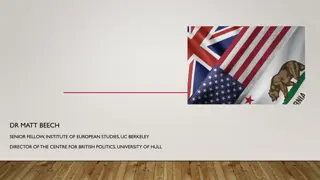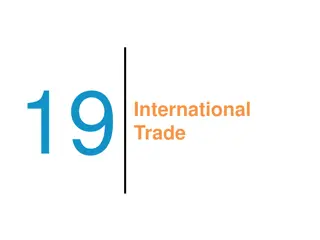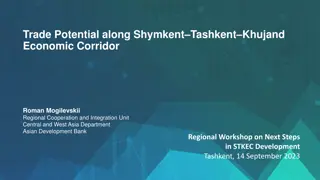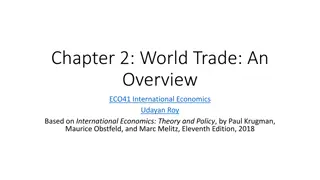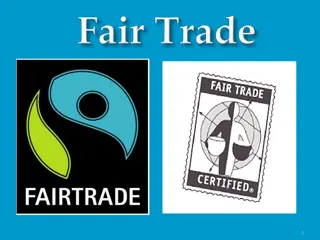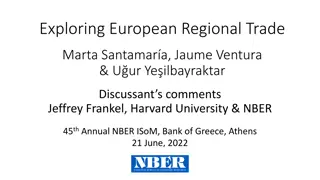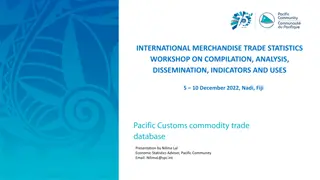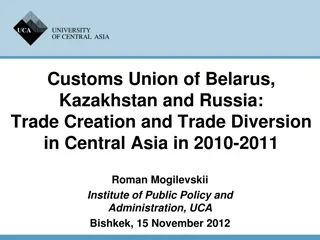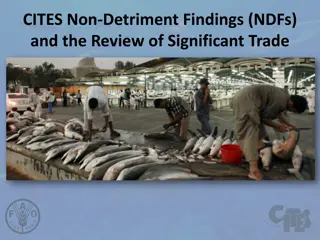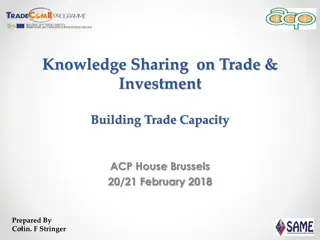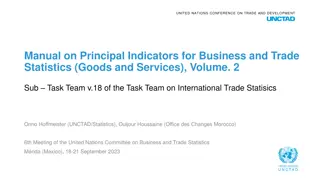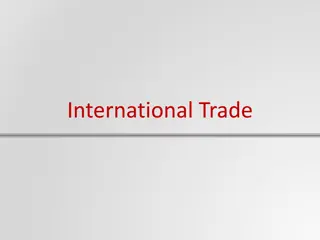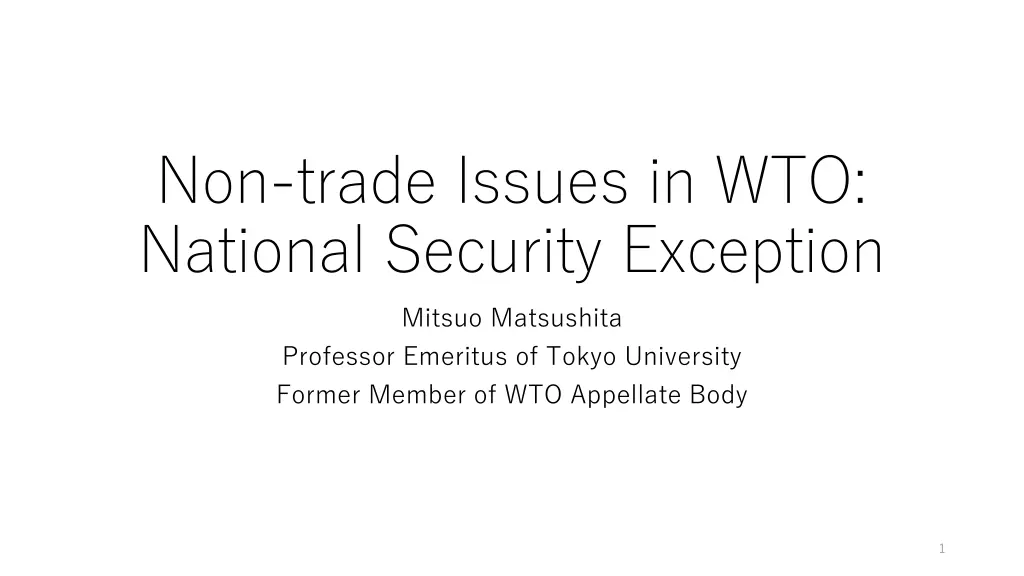
National Security Exception in WTO: Insights by Matsushita
Delve into the realm of non-trade issues in the WTO, focusing on the national security exception and its significance in global trade. Explore the GATT provisions, the wide discretion granted to contracting parties, and a case study involving Russia and Ukraine. Gain valuable insights from Professor Matsushita on the delicate balance between national security and international trade obligations.
Download Presentation

Please find below an Image/Link to download the presentation.
The content on the website is provided AS IS for your information and personal use only. It may not be sold, licensed, or shared on other websites without obtaining consent from the author. If you encounter any issues during the download, it is possible that the publisher has removed the file from their server.
You are allowed to download the files provided on this website for personal or commercial use, subject to the condition that they are used lawfully. All files are the property of their respective owners.
The content on the website is provided AS IS for your information and personal use only. It may not be sold, licensed, or shared on other websites without obtaining consent from the author.
E N D
Presentation Transcript
Non-trade Issues in WTO: National Security Exception Mitsuo Matsushita Professor Emeritus of Tokyo University Former Member of WTO Appellate Body 1
WTO/GATT and Non-Trade Issues WTO aims at liberalizing trade and investment. However, there are areas in the economy where free trade would not create a good performance. Examples are: (1) national security which requires control of export, import, investment and transfer of technology, (2) environmental protection where an excess of activities of enterprises in free market generate negative impacts on the environment and, in this way, the deterioration of the conditions in which human beings have to exist; (3) the protection of human rights in which human dignity must be protected even at the cost of economic efficiency and (4) pandemic where all efforts must be centered on the combat to overcome it. In this presentation, the issues relating to national security is discussed. 2
GATT: XXI: National Security Provision The supreme value of a state is its existence. A state therefore has the right to take measures to safeguard its existence. GATT: Art. XXI recognizes this need and exempts activities of a state to protect itself from outside threats from the disciplines of WTO/GATT. All FTAs have provision similar to GATT: Art. XXI. GATT: Art. XXI(a)(iii) exempts from the GATT obligations any state action taken in time of war or other emergency in international relations 3
Wide Scope of Discretion Under GATT: Art. XXI, contracting parties are given wide discretion when invoking measures. Parties can invoke Art. XXI whenever they deem that there is a situation that threatens its national security. Parties are authorized to decide what constitutes national security and therefore the judgment is largely reserved to the discretion of the party invoking it. However, the principle of good faith prevent contracting parties from abusing the discretion. For example, taking protectionist measure under the name of national security and unduly restricting import is prohibited. 4
The Russian Cargo Case (2019, WT/DS512/R) In relation to the War between Russia and Ukraine, Russia prohibited passage of Ukrainian goods designed to a third country through the Russian territory. Ukraine claimed that this measure amounted to an infringement of GATT: Art. V which guarantees the free passage of products of a contracting party destined to a third country through the territory of another contracting party. Russia denied the power of GATT to decide what the belligerents are and claimed that this is entirely left to the judgment of belligerents. 5
Contd Panel stated that contracting parties do not have 100% free hand in deciding what is national security for them. Panel held that it retains the power to decide for contracting parties the meaning of national security. On that basis, Panel examined the Russian measure and decided that the measure taken by Russia in order to meet the war between Russia and Ukraine amounted to measures in the sense of GATT: Art: XXI. On this basis, the Russian measure was held as justified by GATT: Art. XXI. 6
Saudi IP Case (WT/DC567/8, Appeal Pending) Qatar claimed that Saudi national broadcasting agency infringed IP rights that Qatar has in Saudi because it broadcast items covered by IP rights owned by Qatar in Saudi. It claimed that Qatar s request for relief at Saudi s civil court was blocked by Saudi s interference. Saudi argued that the measure in question amounted to a measure taken in order to deal with wartime or emergency situations and exempted by TRIPS: Art. 73(b)(iii)(exempted national security measure). Panel held that the measures were permitted under this TRIPS provision. Qatar appealed the case to AP and it is still pending. 7
Ambiguity of GATT: XXI GATT: XXI Nothing in this Agreement shall be construed (b) to prevent any contracting party from taking any action which it considers necessary to its essential security interest (iii) taken in time of war or other emergency in international relations . (underline supplied) Two issues: (a) Does this wording suggest that a contracting party can decide what the national security is? and (b) What is the meaning of or other emergency ? What is the reach of the word emergency other than war? 8
Comparison of GATT: XXI & XX Chapeau of GATT: XX: Subject to the requirement that such measures are not applied in a manner which constitute a means of arbitrary or unjustifiable discrimination between countries where the same questions prevail or a disguised restriction on international trade, nothing in this Agreement Chapeau provides for a requirement that provisions in GATT: XX shall not be abused or misused. In contrast, GATT: XXI has no chapeau. What is the implication of the lack of chapeau? What happens if GATT: XXI has been abused? John Jackson says that XXI provides a dangerous loophole and that there is little that can be done about it .(Jackson: The Law of GATT, p. 748). 9
The Good Faith Principle In the Russian Cargo Case, the panel warned that the good faith principle required that GATT: XXI should not be abused and its good faith application is necessary. Common sense requires that good faith should be kept in interpreting GATT: XXI but then how the lack of Chapeau in XXI in comparison with XX can be explained? The only explanation would be that the good faith principle is an underlying norm of all GATT provisions and treaty interpreters should respect that principle. 10
Guidelines for Interpretation Enactment of a provision in GATT for preventing abuses is necessary but an amendment of GATT: XXI to add Chapeau would be politically difficult. Alternatively, WTO Secretariat or a group of eminent persons should draft a set of guidelines for interpreting GATT: XXI and delineate by illustrations the kinds of situations in which GATT: XXI can be invoked. Guidelines should contain such items as (a) the meaning of war and other emergency can be read together as one provision suggesting that emergency, (b) the warning that contracting parties should not overuse GATT: XXI, (c) the use of trade remedies (AD, CVD, SG) as much as possible if the real purpose is the protection of domestic industry. 11
Extraterritorial Application of Export Control Legislation The U.S. Export Control Act and the Chinese Export Control orders apply extraterritorially. Both U.S. and Chinese export control legislations apply to re-export of products to a third country if the product to be exported is controlled by U.S. or Chinese law. Example: U.S. gov t designates Product X as a controlled item and prohibits its export to Country A. If, for instance, a Japanese company imports Product X from a U.S. company and re-export it from Japan to countries designated as prohibited area, such export is prohibited by the U.S. legislation. Chinese export control legislation applies to re-export of a product subjected to the Chinese regulation if it was imported from China to a foreign country and is re-exported from there to a third country where export of that item is prohibited under Chinese Law. 12
Sequence of Events (1) PRC U.S. PRC Gov t U.S. Gov t Penalty(3) (4) Prohibit export to China Customer XC (1) Stop export to China(2) XC=X s subsidiary in China Company X Third Country
Possibility for Divided Loyalty Case I Given that both U.S. and Chinese trade measures and countermeasures apply extraterritorially, there is a real possibility that enterprises of a third country doing business with U.S. and China are caught between conflicting laws and regulations of both countries. For example, suppose the following hypothetical situation: Company X (a company of third country) imports gyro from U.S. and, using it as a component, produces helicopters for agricultural uses (dual use products) and exports them to China. U.S. authority can issue an order under the Export Control Reform Act prohibiting Company A from exporting them to China. Company A complies with US order and stops export of the helicopter to China. China invokes the Export Control Law, the Anti-Foreign Sanctions Law or the Anti-Extraterritorial Application Order and prohibits any organization including Company A from complying with U.S. law, that is, to stop ceasing exporting the helicopters to China. 14
Contd Art. 11 of Anti-Foreign Sanctions Law states that any organization and individual shall not execute or cooperate with foreign discriminatory measures imposed against Chinese citizens and organizations. Article 12 continues to state that If an organization or individual violates the above prohibition, Chinese citizen or organization adversely affected by such measure can bring a legal action against them in PRC court and seek for injunction to halt it and to indemnify the damage thereby caused. Whether a criminal penalty or administrative order is issued is not clearly stated in the Law. As to whom Article 11 applies, it merely says any organization and individual does not limit its application to Chinese or domestic entity. Therefore, from the absence of such words, it can be inferred that it includes foreign individuals and organization engaged in implementing the U.S. sanctions under ECRA. 15
Contd It seems certain that, in this situation, the Chinese prohibition applies to the Chinese subsidiary of Company X. Whether it applies to Company X in a third country is not clear. However, the omission of adjective such as domestic or Chinese in Article 12 of the Anti- Foreign Sanctions Law seems to indicate that it can be applied to Company A, the parent company in Japan. If a PRC court has handed down an injunction or damage award to Company X, how is it enforced? A Chinese court s injunction and damage award cannot be enforced in any country outside China. However, the Chinese subsidiary of Company X is a proxy of the parent. The Chinese court order applies to the Chinese subsidiary of Company X. For non-compliance of injunction, fine will be imposed and any property that the subsidiary or parent owns in China will be confiscated as fine and sold for indemnification. 16
Sequence of Events (2) PRC U.S. PRC Gov t Export stops(3) U.S. Customer Y sues XC Company X (4) PRC Gov t Order (1) X directs XC to stop export to U.S. (2) XC=Company X s Subsidiary in China Company X Third Country
Divided Loyalty Case II Suppose PRC authority, under the Anti-Foreign Sanctions Law, issues a prohibition ordering that any organization or individual cease exporting Product X to U.S. Company Y. Company A has a contract with U.S. Company Y in accordance with which Company A s Chinese subsidiary exports Product X to U.S. Company Y. Under the Chinese order, Company A revokes the contract with U.S. Company Y. U.S. Company Y sues Company A on account of the breach of contract in U.S. court. If Company A continues its contract with U.S. Company B and keeps exporting Product X to U.S. Company B, it violates the provisions of Anti-Foreign Sanctions Law and Anti-Foreign Extraterritorial Application Rule and subjected to penalty, injunction and damage action in China. 18
Blocking & Claw Back Statutes In order to deal with extraterritorial application of U.S. export control law, in 1950 -1980 , UK, Canada, Australia (and some other countries) enacted blocking and claw back statutes to prohibit their nationals from complying with U.S. laws which is applied extraterritorially and affecting re-export from those countries. In 2018, in order to counteract extraterritorial application of a foreign law, EU Commission adopted an update of EU s blocking statute providing that any decision under a foreign law which is applied extraterritorially is not recognized in EU authority. Claw back statute authorizes countries affected by extraterritorial application of law by other countries: (a) to issue an order for non- recognition of any order in their territories which they seem as infringing their sovereignty and (b) to allow their nationals to claw back the damage which they had been ordered to pay in the infringing countries. 19
Principles of Jurisdiction in Customary International Law 5 principles in int l law: (1) territorial principle, (2) nationality principle, (3) protective principle, (4) universality principle and (5) passive nationality principle. On extraterritorial application of export control laws, territorial principle, protective principle and possibly nationality principle are relevant. Objective territorial principle: a state can exercise jurisdiction over a conduct initiated abroad and brings about effect in the territory. The question here is how wide is effect , i.e., Should effect be an effect which is a part of a conduct in question or can it be a mere economic effect? No clear rule yet but the scope of effect in the practices of nations (U.S., EU, China, etc.) is expanding. 20
Contd Protective jurisdiction: A state can exercise jurisdiction over a conduct initiated abroad if that conduct adversely affect the security of the invoking state. In the past precedents and commentaries, its scope is rather limited to conducts as counterfeit of national currency and public documents, provocation of insurrection, espionage and terrorism. A measure taken in time of war or warlike situations will be justified by customary international law. If an emergency is justified by GATT: XXI, this would be justified by customary international law. 21
Advance Notification and Consultation In order to avoid confrontation and conflict of laws relating to extraterritorial application of national security laws, an agreement or understanding between the trading nations on the advance notice and consultation when issues of extraterritoriality occurs. Such procedures include (a) prior notification of extraterritorial application between the invoking and the affected countries; (b) consultation between those countries and (c) cooperation between those countries with the view to mitigating the impact of such extraterritorial application and avoidance of conflicts. 22
International Agreement or Understanding An international agreement or understanding among the states involved in extraterritorial application of export control laws is desirable. Such agreement can contain such items as consultation, exchange of information and cooperative relationship between the states involved. International fora such as UN, OECD, UNCTAD and WTO can be an appropriate forum to discuss these matters and come up with an international scheme or mechanism for resolution of conflicts that arise from extraterritorial application of export control laws and policies. 23

